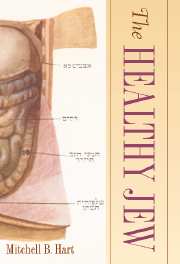Book contents
- Frontmatter
- Contents
- Preface and Acknowledgments
- THE HEALTHY JEW
- Introduction: “Links in a Long Chain”: Jews, Judaism, Health, and Hygiene
- 1 “'Tis a Little People, But It Has Done Great Things”: The Role of Health and Medicine in Modern Jewish Apologetics
- 2 Moses the Microbiologist: Alfred Nossig's The Social Hygiene of the Jews
- 3 Healthy Hebrews, Healthy Jews: The Bible as a Sanitary Code in Anglo-American Medical Literature
- 4 From Ghetto to Jungle: Darwinism, Eugenics, and the Reinterpretation of Jewish History
- 5 TB or Not TB, That Was a Jewish Question: Moses, Kashrut, and the Prevention of Tuberculosis
- 6 “Then What Advantage Does the Jew Have?”: Judaism as a Model for Christian Health
- 7 Conclusion
- Notes
- Bibliography
- Index
1 - “'Tis a Little People, But It Has Done Great Things”: The Role of Health and Medicine in Modern Jewish Apologetics
Published online by Cambridge University Press: 18 July 2009
- Frontmatter
- Contents
- Preface and Acknowledgments
- THE HEALTHY JEW
- Introduction: “Links in a Long Chain”: Jews, Judaism, Health, and Hygiene
- 1 “'Tis a Little People, But It Has Done Great Things”: The Role of Health and Medicine in Modern Jewish Apologetics
- 2 Moses the Microbiologist: Alfred Nossig's The Social Hygiene of the Jews
- 3 Healthy Hebrews, Healthy Jews: The Bible as a Sanitary Code in Anglo-American Medical Literature
- 4 From Ghetto to Jungle: Darwinism, Eugenics, and the Reinterpretation of Jewish History
- 5 TB or Not TB, That Was a Jewish Question: Moses, Kashrut, and the Prevention of Tuberculosis
- 6 “Then What Advantage Does the Jew Have?”: Judaism as a Model for Christian Health
- 7 Conclusion
- Notes
- Bibliography
- Index
Summary
The notion of a particular and particularly profound connection between Jews and medicine has a long narrative history. We know that medicine was for centuries one of the few respectable professions that Jews in Europe were allowed to pursue; they could study in Italian universities and practice in the courts and palaces of Christian and Muslim rulers. Even the popes had their Jewish physicians. Histories of the Jews in Europe, especially those written in the mode of “great men” narratives, are replete with the names of eminent intellectual and political figures who counted the practice of medicine as one of their achievements: Hasdai ibn Shaprut in Andalusia, Jehuda Halevi in Christian Toledo and then in Moslem Cordova, Nachmanides in Aragon, and, of course, Maimonides in Fostat, near Cairo. The notion of a unique Jewish contribution to medicine, framed in apologetic terms, reaches back at least to the end of the sixteenth century, and David de Pomis's De medico hebraeo. Enarratio apologetica (Venice, 1588). I will not aim in this chapter, however, to attempt a comprehensive survey of this apologetic literature. Rather, I want to engage with examples from the nineteenth and twentieth centuries in an attempt to draw out some of the formal elements of Jewish apologia related to medicine and science – in particular, the nexus of Moses, Judaism, and hygiene – and to explore the mechanisms of this genre.
- Type
- Chapter
- Information
- The Healthy JewThe Symbiosis of Judaism and Modern Medicine, pp. 28 - 53Publisher: Cambridge University PressPrint publication year: 2007



